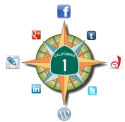 If you ever wonder how I find all my news chum, I’ll tell you: there are three primary sources. First, I skim online news sites as a palate cleanser when switching tasks or when my brain needs a little clearing. Second, I have a large collection of RSS feeds that I monitor. Lastly, some of the people and sites I read (such as Andrew Ducker and Mental Floss) often posts lists of interesting links.
If you ever wonder how I find all my news chum, I’ll tell you: there are three primary sources. First, I skim online news sites as a palate cleanser when switching tasks or when my brain needs a little clearing. Second, I have a large collection of RSS feeds that I monitor. Lastly, some of the people and sites I read (such as Andrew Ducker and Mental Floss) often posts lists of interesting links.
For years, to monitor the RSS Feeds, I’ve been using Google Reader. I moved to reader after Bloglines changed ownership; I moved more RSS feeds over as Livejournal declined (I used the syndication feature in LJ). Alas, yesterday, Google announced their intention to abandon me and leave me out in the cold, as they are closing Google Reader on July 1, 2013. They blame declining readership; however, the general concensus is that (a) they want to push Google+, and (b) they couldn’t sell ads on Google Reader. The closure is big news and is affecting a lot of people — it’s even made the LA Times! There are even some who believe this is Google’s attempt to kill off RSS.
So I’m looking into alternatives (see also this article). Although I guess I could move back to Bloglines, I don’t recall liking their new interface enough to do so.* Currently, I’ve switched over to netvibes, because they were responsive enough last night to move stuff over. They were a bit of a pain: they liked to create an initial dashboard with loads of stuff in it I had to delete; I also needed to go through the Google Reader Takeout process to get a zip of your feed info, extract the subscriptions.xml from the resulting zip, and import that into Netvibes. I looked into Newsblur, but their site was so hammered last night I couldn’t import anything. I’ll try them again if I end up not liking netvibes. Other sites mentioned that I haven’t tried are Feedly, and The Old Reader. There are also local clients, but I wanted a reader where I could see the same reading list from multiple machines; additionally, many of the local readers coordinate with Google Reader.
[* ETA: It turns out Bloglines still exists… but is using Netvibes under the hood, with the same login and a different dashboard.]
Still, Google, this Spring Cleaning has gotten ridiculous. You keep abandoning things people use, just because you cannot monetize them. This makes people distrust cloud applications. What’s next? Google Calendar? I used to think Google was a force for good, but their behavior of late is making me realize that they are just like other companies.
Music: Girl Crazy (1990 Studio Cast): “Overture”


 As indicated in my previous post, staring at the collected links while eating my lunch identified two distinct themes. One was entertainment. The other (which is the subject of this post) has to do with some interesting uses of technology:
As indicated in my previous post, staring at the collected links while eating my lunch identified two distinct themes. One was entertainment. The other (which is the subject of this post) has to do with some interesting uses of technology: Earlier this week, I wrote about
Earlier this week, I wrote about  Movies were movies when you paid a dime to escape… and when you paid that dime, the movie was presented in a traditional way: a very bright light was shone through a film print of the movie provided by the distributor, and projected onto the “silver screen” (which actually was a little silver so as to reflect more light). Nowadays, we pay two orders of magnitude more (approx $10) to see a digital projection of the movie, which is delivered on a DRM-protected hard disk. Hollywood is expected to stop distributing traditional 35-millimeter film prints to all U.S. theaters later in 2013. Conversion costs to the new system are expensive, on the order of $70,000 or more per screen. These costs are impacting different types of theatres in many ways. Today’s lunchtime news chum looks at just a few of the impacts:
Movies were movies when you paid a dime to escape… and when you paid that dime, the movie was presented in a traditional way: a very bright light was shone through a film print of the movie provided by the distributor, and projected onto the “silver screen” (which actually was a little silver so as to reflect more light). Nowadays, we pay two orders of magnitude more (approx $10) to see a digital projection of the movie, which is delivered on a DRM-protected hard disk. Hollywood is expected to stop distributing traditional 35-millimeter film prints to all U.S. theaters later in 2013. Conversion costs to the new system are expensive, on the order of $70,000 or more per screen. These costs are impacting different types of theatres in many ways. Today’s lunchtime news chum looks at just a few of the impacts: A number of articles over the last few days have gotten me thinking about how technological innovations are going to affect my favorite music player,
A number of articles over the last few days have gotten me thinking about how technological innovations are going to affect my favorite music player,